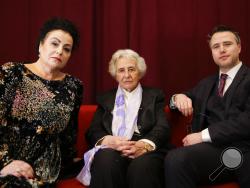BERLIN (AP) — Simon Wallfisch grew up in London as the grandson of an Auschwitz survivor who swore to never return to the country that murdered her parents and 6 million other Jews.
But more than 70 years after the Holocaust, Brexit has prompted Wallfisch and thousands of other Jews in Britain to apply for German citizenship, which was stripped from their ancestors by the Nazis during the Third Reich.
"This disaster that we call Brexit has led to me just finding a way to secure my future and my children's future," said Wallfisch, 36, a well-known classical singer and cellist who received his German passport in October. "In order to remain European I've taken the European citizenship."
Britons holding dual citizenship from an EU country like Germany will retain the privilege of free movement and work across the soon-to-be 27-nation bloc.
Many Britons whose ancestors came from other parts of Europe have been claiming citizenship in other EU member states so they can keep ties to the continent. But for Jews whose families fled Germany to escape the Nazis, the decision has meant re-examining long-held beliefs about the country.
Wallfisch's grandmother, Anita Lasker-Wallfisch, was 18 in December 1943 when she was deported to Auschwitz, the Nazi death camp in occupied Poland where more than 1 million Jews were murdered.
She survived because she was a member of the camp's girls' orchestra. As a cellist, she had to play classical music while other Jews were taken to the gas chambers.
In November 1944, she was taken to Bergen-Belsen — the concentration camp where diarist Anne Frank died after also being transferred from Auschwitz at about the same time — where she was eventually liberated by the British army in April 1945.
Lasker-Wallfisch immigrated to Britain in 1946, got married and had two children. Her career as a famous cello player took her around the world, but it took decades until she overcame her hatred enough to set foot on German soil again in the 1990s.
In recent years, Lasker-Wallfisch, 93, has become a regular visitor, educating children in Germany about the Holocaust.
On Sunday's International Holocaust Remembrance Day, Lasker-Wallfisch, her grandson Simon and her daughter Maya Jacobs Lasker-Wallfisch performed for the first time together on stage at the Jewish Museum Berlin in commemoration of their family.
They played music with other members of their extended family and read letters from the past as a tribute to those who survived and those who perished in the Shoah.
Before the show, the three generations sat together on the red couch in the museum's dressing room and told The Associated Press about the emotional thoughts that went into the younger two's decision to take German citizenship.
"We cannot be victims of our past. We have to have some hope for change," said Maya Jacobs Lasker-Wallfisch, a 60-year-old London psychotherapist who is Simon's aunt and is still waiting on her German citizenship to be approved. "I feel somehow in a strange way triumphant. Something is coming full circle."
Her application is one of more than 3,380 requests that the German Embassy in London has received since the Brexit referendum in June 2016. In comparison, only around 20 such requests were made annually in the years before Brexit. Article 116 of the German Constitution allows the descendants of people persecuted by the Nazis to regain the citizenship that was removed between 1933 and 1945.
More than just retaining the ability to travel easily from country to country or maintain business ties, Jacobs Lasker-Wallfisch said there are other, more emotional reasons to acquiring German citizenship, with Britain due to leave the European Union on March 29.
"I feel an aliveness here (in Berlin) that I have not experienced before, but it totally makes sense because after all I am German," Jacobs Lasker-Wallfisch said. She added that if the country behind the Holocaust is now one that welcomes the descendants of the victims, "that's a good thing."
But Anita Lasker-Wallfisch, who lived through the horrors of the Holocaust, remained skeptical and pessimistic.
"Jewish people never feel secure," she said to her daughter and grandson, reminding them of her own past. "I had German nationality — it did not buy me security."

